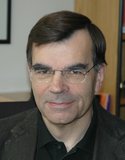Spoken Dialogue Systems: Progress and Challenges: Difference between revisions
From HLT@INESC-ID
(Created page with "__NOTOC__ {{speakerLargeBio| |name=Steve Young |image=young.jpg |email=sjy@eng.cam.ac.uk |www=http://mi.eng.cam.ac.uk/~sjy/ |bio=Steve Young received a BA in Electrical Sciences ...") |
No edit summary |
||
| Line 2: | Line 2: | ||
{{speakerLargeBio| | {{speakerLargeBio| | ||
|name=Steve Young | |name=Steve Young | ||
|image= | |image=steve_young.jpg | ||
|email=sjy@eng.cam.ac.uk | |email=sjy@eng.cam.ac.uk | ||
|www=http://mi.eng.cam.ac.uk/~sjy/ | |www=http://mi.eng.cam.ac.uk/~sjy/ | ||
Latest revision as of 10:15, 6 May 2013
| Steve Young |
 His research interests include speech recognition, language modelling, spoken dialogue and multi-media applications. He is the inventor and original author of the HTK Toolkit for building hidden Markov model-based recognition systems (see http://htk.eng.cam.ac.uk), and with Phil Woodland, he developed the HTK large vocabulary speech recognition system which has figured strongly in DARPA/NIST evaluations since it was first introduced in the early nineties. More recently he has developed statistical dialogue systems and pioneered the use of Partially Observable Markov Decision Processes for modelling them. He also has active research in voice transformation, emotion generation and HMM synthesis. He has written and edited books on software engineering and speech processing, and he has published as author and co-author, more than 250 papers in these areas. He is a Fellow of the Royal Academy of Engineering, the IEEE, the IET and the Royal Society of Arts. He served as the senior editor of Computer Speech and Language from 1993 to 2004 and he was Chair of the IEEE Speech and Language Processing Technical Committee from 2009 to 2011. In 2004, he received an IEEE Signal Processing Society Technical Achievement Award. He was elected ISCA Fellow in 2008 and he was awarded the ISCA Medal for Scientific Achievement in 2010. He is the recipient of the 2013 Eurasip Individual Technical Achievement Award. |
| Addresses: www mail |
Date
- 14:30, Monday, June 24th, 2013
- Room Anfiteatro do Pavilhão Interdisciplinar, IST Alameda
Speaker
- Steve Young, University of Cambridge, United Kingdom
Abstract
The potential advantages of statistical dialogue systems include lower development cost, increased robustness to noise and the ability to learn on-line so that performance can continue to improve over time. This talk will briefly review the basic principles of statistical dialogue systems including belief tracking and policy representations. Recent developments at Cambridge in the areas of rapid adaptation and on-line learning using Gaussian processes will then be described. The talk will conclude with a discussion of some of the major issues limiting progress.